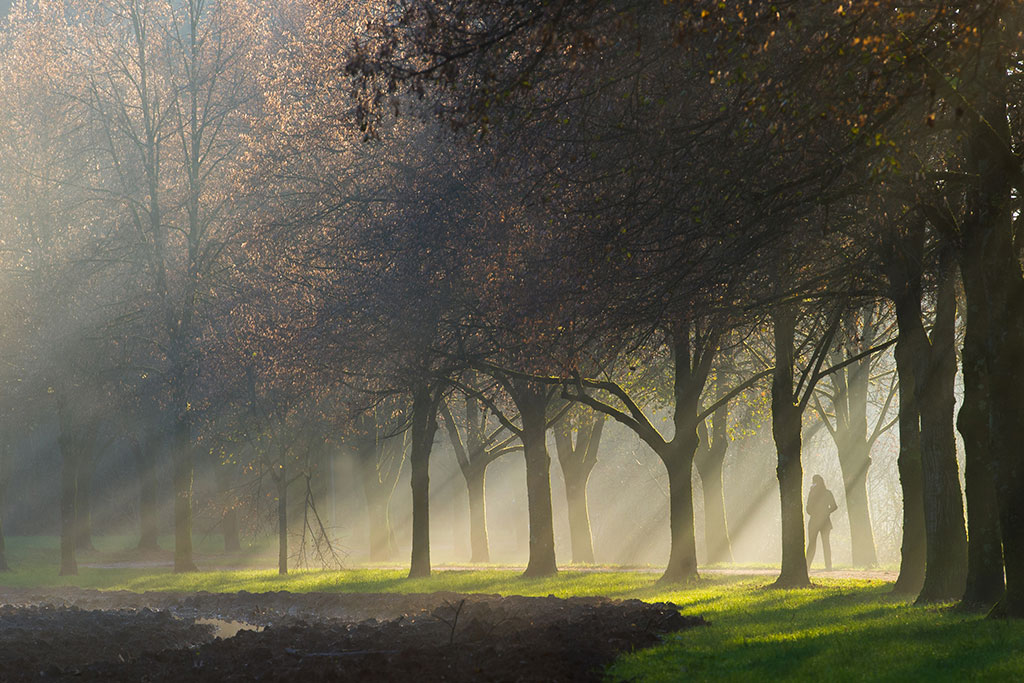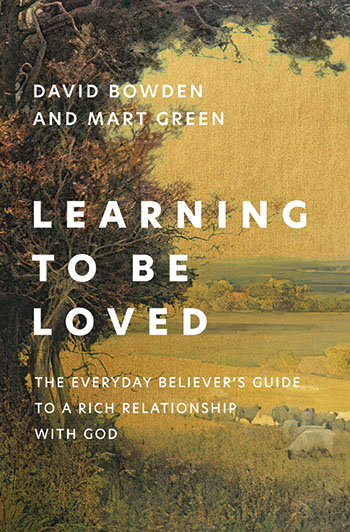
Seeing the Unseen God
We long to see the ones we love. Yet we can’t see God (John 1:18; 1 Tim. 6:16). We can’t lock eyes with him. We can’t experience what his hugs feel like. That can make it difficult to feel his love and love him in return.
The good news is God is not hiding from you. He wants to be found. He is constantly saying, Look at me! I’m right here. We just need to learn how to look.
God has saturated our sight with signs. He has built billboard after billboard advertising his beauty. The problem is most of us aren’t paying attention. Our modern world has made it increasingly easy to distance ourselves from nature, while simultaneously making it harder for many to find a peaceful slice of it.
This has led us to believe we don’t need creation to connect with God. We have plenty of other avenues. But God has covered creation with what we’re craving. God uses nature as a flashing arrow that points to his existence, power, character, and appearance.
Nature is a crucial way God shows us himself and his love. We need creation to connect with our creator.
Seeing God in Nature
King David, the famous king of God’s people, Israel, told us what of God can be seen in creation when he wrote a song that we call Psalm 19.
“The heavens declare the glory of God; the skies proclaim the work of his hands. Day after day they pour forth speech; night after night they reveal knowledge.” (v. 1). Clouds and stars, trees and grass, animals and atoms are all talking to us. Constantly and without prompting from us, all of these and more are saying something about God.
We long to see what we love. Psalm 19 says God reveals aspects of himself to us in creation. God uses creation to show us his glory, handiwork, and knowledge.
The Hebrew word kabod, often translated as glory, means “weight.” You have surely felt the meaning of this weight when walking into a grand cathedral or eating a masterful meal or seeing an unbelievably talented individual perform a feat you previously thought impossible. You feel in awe, dumbstruck, lost for words, and baffled.
God does this endlessly in every corner of creation. Boundless galaxies and microscopic molecules, treacherous mountains and calm creeks, fearsome storms and warm spring days all have the capacity to grab our attention, drop our jaws, and leave us fumbling for an explanation.
How could this beauty, strength, complexity, and solemnity have come to be? How can creation be expansive enough for a supernova but intimate enough for a gopher hole? How can the sun feel this good, the rain this refreshing, the wind this soft, and the grass this sweet? These questions and their answers are spoken by creation every moment of every day. The heavens declare the glory of God.
Seeing God’s Handiwork
Creation also shows us God’s handiwork. The world displays what God has made in the same way a museum displays art. At the edges of science and space, in the depths of unexplored seas and unplumbed quarks, creation says, “God made me.”
In the balance of the earth’s axis and the fine-tuning of our solar system, creation says, “God did this.”
Our world is full of things that have been made. We live in an art gallery. Every day we walk past installations in the greatest museum of creativity. The sculptures of trees, the stretched canvas of the sky, and the detailed brushwork of a field cry out for us to behold the one who formed them. They call us to stop, enjoy, and revel in their composition and composer. God has hand formed countless wonders to show us his artistry.
Finally, nature reveals knowledge. On a recent hike with a friend of mine, we came to a lookout point where we could take in the view of the peak we were attempting to summit. I read aloud the beginning of Psalm 19 and we prayed for the knowledge of God.
What we meant by that was that we wanted to know God. We wanted to see him in that mountain. What was it about God that he wanted to reveal to us about himself through this huge, permanent, and gorgeous mountain? Then we realized that’s not what Psalm 19 primarily has in mind.
The mountain in front of us does provide us with knowledge about God, as we’ve seen in his glory and handiwork. But more than that, the mountain provided us with a glimpse of God’s knowledge. It showed us what God knows.
How was this mountain made? God knows. Where were we when he made it? God knows. How many lizards were born on the mountain this year? What’s the exact number of ants that now walk along its rocks? God knows all of this and more.
We didn’t know any of this, of course. But God did. The mountain boasted of God’s knowledge. Its rocks poured forth speech about how God formed it. Its cacti, bushes, and trees declared the brilliant mind of the one who dreamed them all up.
We long to see the God we love. Creation can begin to meet that longing. God uses it to make us feel his weighty glory. He has filled our world like an art museum, pointing us to the beautiful work of his hands. And he shows us how endless and staggering his knowledge is through the incredible things he has made.
Psalm 19 is only one place the Bible teaches us how God reveals himself to us in nature. So much more could be said about how God is walking through the doorway of nature to show himself to you.
The heavens declare the glory of God;
the skies proclaim the work of his hands.
Day after day they pour forth speech;
night after night they reveal knowledge.
They have no speech, they use no words;
no sound is heard from them.
Yet their voice[b] goes out into all the earth,
their words to the ends of the world.
In the heavens God has pitched a tent for the sun.
It is like a bridegroom coming out of his chamber,
like a champion rejoicing to run his course.
It rises at one end of the heavens
and makes its circuit to the other;
nothing is deprived of its warmth.
The law of the Lord is perfect,
refreshing the soul.
The statutes of the Lord are trustworthy,
making wise the simple.
The precepts of the Lord are right,
giving joy to the heart.
The commands of the Lord are radiant,
giving light to the eyes.
The fear of the Lord is pure,
enduring forever.
The decrees of the Lord are firm,
and all of them are righteous.
They are more precious than gold,
than much pure gold;
they are sweeter than honey,
than honey from the honeycomb.
By them your servant is warned;
in keeping them there is great reward.
But who can discern their own errors?
Forgive my hidden faults.
Keep your servant also from willful sins;
may they not rule over me.
Then I will be blameless,
innocent of great transgression.
May these words of my mouth and this meditation of my heart
be pleasing in your sight,
Lord, my Rock and my Redeemer.
–Psalm 19
Adapted from Learning to Be Loved: The Everyday Believer’s Guide to a Rich Relationship with God by David Bowden and Mart Green.

Learning to Be Loved
Are you feeling spiritually stuck? Release that frustration and discover a more natural way to relate to God in this biblically grounded, transformative book about how our passionate and creative God offers us gateways—that are already in our lives—to draw us closer to him.
Learn More







Learning more deeply about God daily. Thank you for bringing it daily to my inbox.
Thank you. I’m reading the Bible for the first time ever and I do appreciate that you outline this Scripture. It’s always nice to be reminded of Gods Glory!
May the Lord open your eyes to see the wonderful truth in His Word, Amen
So true! I love this!
Thank you for this. I’m starting out on a new searching venture with God’s help through his Holy Spirit. Because of feeling so ashamed of things I’ve done in my life growing up, I couldn’t feel free. I still have times when I think…how could I be loved and forgiven? I need reassurance of God’s forgiveness even though I read in Scripture of God’s love, through Jesus’ death, his shed blood and resurrection. He has the keys to heaven and hell. He’s overcome all. I know all of this through God’s Word. I want to be able to tell others of his love for them also, but I’ve held back because, how can I who has failed him so much, be able to tell others about his love for them? Can you give me some sort of encouragement to go forward? I’m nothing but God is everything.
Dear Raymond,
I do not know where to start, but, let’s use Apostle Paul (also known as Saul) in the books of Acts. Apostle Paul persecuted the Church of God because he thought he was doing what was right but he was ignorant. Later, when he got converted, he was used mightily for the Kingdom Business. No one is beyond the reach of God’s love. Greater love has none than He that laid down His life for our sins. Be assured of this, Raymond, in Romans 5:8, the Bible says, “But God demonstrates His own love for us in this: While we were STILL sinners, Christ died for us.” (Emphasis mine). So, do not be weighed down by your past. Look to the present and what God holds for you in the future and the coming age. Do not worry. He is with you to the very end of time. God be with you and God bless you, Raymond.
Thank you – Beautiful reminder of how great and amazing and wonderful our God is !!
God is indeed our creator and everything around us and within us. No one else!!!
Beautifully written about how magnificent and glorious God is. Thank You
What a beautiful word.
Lord take the darkness from my heart and open my eyes to marvel at the wonders of creation around me. Allow me to hear the earth and sky sing to my ears of your great love for all your creation.
What a piece. May God continually remind us that He is present
May we always see the goodness and presence of God.
I really appreciate this teaching and I am grateful for all you are sharing.